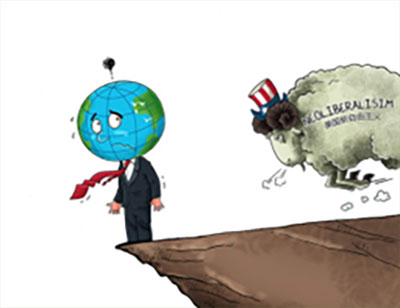Life on the West Island - “An idiotic idea”
06 June 2024

Prominent West Island academic Professor Carl Rhodes has recently declared that neoliberal “trickle down:” economics should be permanently discarded, because it is “idiotic.”
Writing in The Conversation, Professor Rhodes explains the background to neoliberalism and why it has been positively harmful to the wellbeing of most citizens around the globe:
In the 1980s, the world’s economies were shaken up by the idea that if big corporations and wealthy individuals were taxed less and freed from the encumbrance of government regulations, they would grow the economy and people of all socioeconomic groups would be better off financially.
It was dubbed “trickle-down economics”. The story was that through a natural process, some of the wealth created by and for those at the top would trickle down through the rest of the economy, so everyone would benefit from liberating the economic might of the wealthy.
Of course, everybody has not won. Since the advent of the global neoliberal experiment in the 1980s, the world has become increasingly divided into rich and poor. Economic inequality has soared to new heights.
Things have got so bad globally that the World Bank declared 2023 “the year of inequality”. The losses people have suffered as a result of COVID-19, climate change, political conflict and inflation have fuelled the fire of raging inequality. Political populism around the world fans that flame.
We know now definitively that the idea of a trickle-down economy is as idiotic an idea as it seems on face value. That people ever accepted it is reason for embarrassment. That some people are still backing it is insulting to all.
Some of our politicians still hide behind the patently false aphorism that a rising tide lifts all boats. On the contrary, the application of trickle down economics has dumped unearned fortunes on a small class of wealthy individuals, but has left millions more much worse off.
Rhodes says that an increasing number of economists are speaking out against inequality and its overwhelming destructiveness. They are also proposing bold policy measures that can address it.
He highlights recent books by economists Guido Alfani (As Gods Among Men: A History of the Rich in the West), and Ingrid Robeyns (Limitarianism: The Case Against Extreme Wealth). Rhodes says that books such as these help to understand the problem of inequality that billionaires so conspicuously represent, and how the problem might be remedied in the name of justice and shared prosperity.
Alfani says that the wealthy generally lack understanding or sympathy for the struggles of the less fortunate, choosing instead to moralise their wealth through the pretence to good deeds or merit. He concludes that wealthy people hold a fragile social position, always running the risk that the majority will turn against them.
In his book’s final pages, Alfani sums up how expecting benevolence from the rich is not a solution to political and economic inequality. The answer lies in taxation. Political representatives of democratic society must be put in charge of deploying excess resources for the common good. If not, the ultra-wealthy will act as gods among men, wrecking democratic institutions.
Robeyns opens her book by asking, can a person be too rich? With this question, she delves into the ethics of excessive wealth, arguing it should not exist because it legitimatises extreme inequality. Limits should be set such that wealth is capped at a socially agreed amount.
Robeyns clearly states that her idea of limitarianism is not a specific proposal for public policy, but rather a regulative ideal that can inform policy direction. The idea is that the wealth held by any individual should be limited by democratic society through government regulation. It is a simple idea, as Robeyns makes clear, yet one that is not easy. She proposes three types of action that can be taken to pursue her “limitarian” idea:
First, societies should ensure that all citizens have decent living standards and genuine equality of opportunity through education, child care and anti-poverty strategies.
Second, taxation and benefits should be organised so that everyone can live a dignified life and excessive economic inequality is prevented.
Third, societies need to adopt a “limitarian ethos”, so that social values adapt to recognise the value of the social and economic justice that is violated by the existence of extreme wealth.
Professor Rhodes sums up his conclusions from the arguments put forward by Alfani and Robeyns:
Change towards greater justice may be difficult, but there is no reason to believe it is impossible. Forty years of the neoliberal experiment have created a world of vast and increasing inequality, rationalised by the false promises of a global free market. But this can change, and it should change. Most importantly, as these two books attest, there is a growing will to change and to create fairer societies, where the material benefits of the world’s wealth do not accrue to an extreme minority.
On the West Island, our politicians are risk averse, shying away from the desperately needed changes to our economic approaches if we are to address rising inequality and the challenges it poses to policy in many areas, including housing, cost of living, and overall wellbeing of the population. Can we find the courage and creativity to attack the fundamentals of our current social division and poverty – or will we continue to recycle old failed policies?